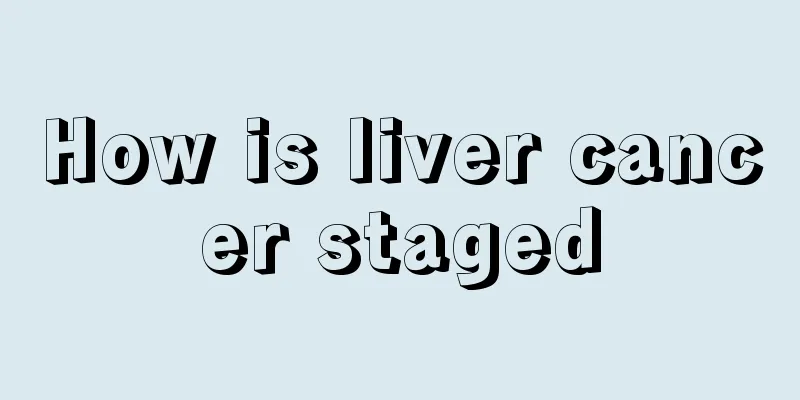Why does my stomach bloat after eating?

|
Many people have experienced bloating, especially for patients with stomach problems, who are more likely to experience bloating, which makes patients feel very uncomfortable. In severe cases, it may even affect the patient's eating habits. However, many patients experience bloating before or after meals, mainly due to being too hungry or full. But some patients also experience bloating as soon as they eat. What's going on? The causes of abdominal bloating include: 1. Food fermentation. Certain foods themselves are prone to causing bloating, such as beans, wheat bran, apples, peaches, onions, cabbage, cereals, and potato foods such as sweet potatoes and potatoes. These are all gas-producing foods. Under normal circumstances, there are a large number of bacteria in the lower ileum and ascending colon. If the chyme stays in this section of the intestine for too long for some reason, the bacteria can cause the chyme to ferment, produce a large amount of gas, and cause abdominal distension. 2. Gas absorption disorder in the gastrointestinal tract. Under normal circumstances, most of the gas in the abdominal cavity is absorbed by the blood vessels in the intestinal wall and then exhaled out of the body through the lungs. In some diseases, blood circulation in the intestinal wall is impaired, affecting the absorption of gas in the intestinal cavity, thus causing abdominal bloating. 3. Bad eating habits. When you eat too fast or talk while eating, you will swallow too much air and cause bloating. 4. People who live a fast-paced life and are under a lot of stress are prone to bloating. Weakened or absent intestinal motility will prevent gas in the intestinal cavity from being discharged from the body, thus causing abdominal bloating. The gas accumulated in the body cannot be discharged from the body, which will put pressure on the digestive system and cause people to feel uncomfortable such as bloating and even pain. When air enters the body, the human body will instinctively burp or fart to expel excess gas. Generally speaking, an adult will pass gas about 10-18 times a day. If there is any abnormality, whether it is too many times or no gas, it will cause abnormal bloating. 5. Certain gastrointestinal diseases. Such as irritability of the bowel, gallbladder disease (may be fat indigestion) and cause bloating. In general, there are many causes of abdominal bloating, and symptomatic treatment should be given according to the different causes of abdominal bloating. There are several treatments for bloating: First, methods to treat abdominal bloating. 1. Use abdominal breathing. The method of abdominal breathing is actually very simple. When we inhale, the belly expands, and when we exhale, the belly contracts. Although you may not be used to it at first, once you get used to it, it will help stimulate gastrointestinal motility and promote the excretion of waste in the body. On the other hand, it can also make the airflow smooth and increase lung capacity. 2. Take gastrointestinal motility drugs, or use lactobacillus tablets to promote gastrointestinal digestion and absorption. Second, treat abdominal bloating through diet therapy. 1. Eat less raw, cold and spicy food. Because raw, cold and irritating foods have a strong irritating effect on the digestive tract mucosa, they can easily cause diarrhea or digestive tract inflammation. 2. Boil fried barley sprouts and kumquats in water and drink it. The specific method is to wash the kumquats, flatten them, then put the fried barley sprouts into a casserole, add 200 ml of cold water, soak for a while, boil for 10 minutes, then put in the kumquats and boil for 5 minutes, drain the juice, add water and boil once, combine the two juices, add a small amount of sugar, and drink as tea. 3. In terms of diet, eat less fried food. Because this kind of food is not easy to digest, it will increase the burden on the digestive tract. Eating too much will cause indigestion and increase blood lipids, which is not good for health. 4. Eat regularly. Studies have shown that eating regularly, at regular times and in regular amounts, can form conditioned reflexes, help the secretion of digestive glands, and facilitate digestion. 5. Supplement vitamin C and vitamin B. Vitamin C has antioxidant and detoxification effects, relieves mental stress, promotes collagen synthesis, and enhances gastric motility; while vitamin B can promote digestion, accelerate the body's metabolism, stabilize emotions, relieve mental stress, and improve sleep. |
<<: Why does my tooth hurt after eating?
>>: Why does my gums hurt when I eat?
Recommend
How to reduce fat on waist
The gradual increase of fat on the waist has brou...
What nutrients do fresh walnuts have?
The walnuts we often eat in our lives are also ve...
Preoperative intestinal care methods for colorectal cancer
Everyone knows that colorectal cancer is a very s...
What's wrong with the small pimples in the anus?
In daily life, the appearance of millet-sized bum...
How to draw the eye bags under the single eyelid
Many women with single eyelids are not satisfied ...
What is thrombosis and how to prevent it?
Middle-aged and elderly friends should be careful...
What are the symptoms of nasal septum deviation and turbinate hypertrophy?
Nasal septum deviation is a common disease. Most ...
The correct way to do leg stretch on the ground
Exercise is an indispensable part of people's...
Is it useful to soak your feet in vinegar?
People who suffer from athlete's foot should ...
Is chemotherapy necessary for gastric cancer?
Gastric cancer is a malignant tumor disease that ...
Can baking soda remove plaque?
Baking soda, commonly known as a dough starter, i...
What are the symptoms of nasopharyngeal carcinoma recurrence after five years? How to treat it after recurrence
What are the treatments for early-stage nasophary...
How to quickly remove strawberry stains
Many people like to eat strawberries very much. E...
What to do if skin allergies cause pimples?
Skin allergy is a common skin problem in real lif...
What are the main symptoms of prostate cancer? Pay attention to these four symptoms
Nowadays, some female friends are very lacking in...









